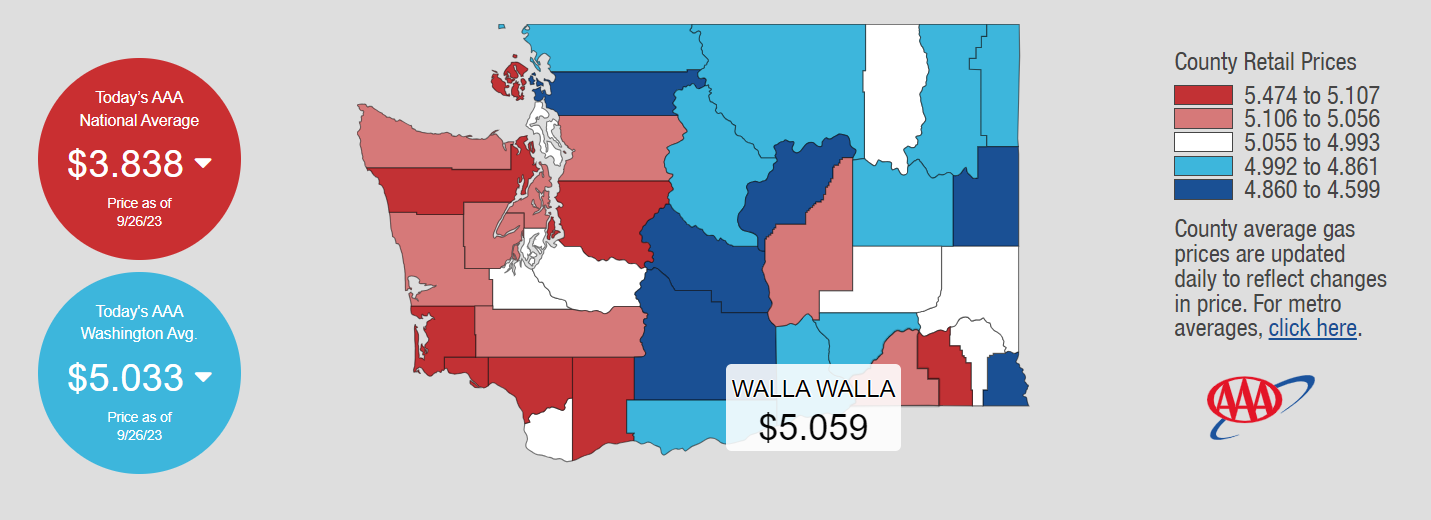September 2023
Dear Neighbor,
Greetings from here at the ranch! Legislators refer to the months between our annual sessions as “interim,” and if you look at when the 2023 session ended (late April) and when the 2024 session begins (early January), we’re not much past the halfway point of this particular interim. That makes it a good time for an update, as my previous report to you was in July.
Now that summer is behind us, I hope it was a safe and productive season for you and your loved ones. It’s been a busy time at our place on top of harvest, the local meetings and community events that go with being your senator, and…welcoming a new family member. We’re happy and thankful to now have a daughter-in-law!
Also, it’s been nice to know how budget appropriations that were on my list when this year’s session began are already bearing fruit. I’m thinking specifically of the Columbia Valley Center for Recovery (formerly called the Three Rivers Behavioral Health Recovery Center), which received $5 million in the new capital budget, and the SR 224 Red Mountain Vicinity project. The public works director for West Richland let me know recently how the additional $5 million put into the new state transportation budget is just what they needed to stay within budget and on schedule.
Climate Commitment Act still inflating gas prices
While Washington no longer has the highest gas prices in the nation, the average cost of regular gas in our state is still north of $5/gallon. That’s also true for the average price in Walla Walla County, although Benton and Franklin are averaging less.
The governor insists this is due to profiteering by the oil industry. If so, why could I have saved $1.30 per gallon for diesel this week by buying it south of the state line? If maximizing profits is truly the intent, it makes no sense to jack up prices in our state but not in Oregon… or Idaho, where the prices are lower still.
Governor Inslee’s argument doesn’t fly with me, but then again he also claimed the full implementation of his Climate Commitment Act would only increase the cost of gas by “pennies” – instead of the 50 or so cents that seems to be the reality.
It might be different if the cap-and-trade approach at the heart of the CCA truly put a cap on the price of carbon. However, at the latest quarterly auction of “carbon allowances” (by the Department of Ecology) on August 30, the “settlement price” was up 12% from the May auction, which in turn was up 16% from the February auction. By refusing to put a cap on the price, the state basically forces fuel suppliers to continue adjusting their prices to recoup the growing cost of the allowances they purchase… and that means more pain at the pump.
Since those auctions began this year, the state has already raked in more than $1 billion, with another auction coming in December. It’s a much bigger haul than was projected by legislative budget writers, and makes the CCA look less like a real carbon-reduction strategy and more like a backhanded gas tax.
Governor Inslee, who pushed for a cap-and-trade policy for years before the CCA was passed in 2021, also claims his approach is the “ultimate measure to cut the cost of gas” and gives people “the choice to be powered by something else” – a reference to things like electrified public transit.
The ag workers I see leaving the fields and orchards each day at this time of year don’t have the option to ride e-buses and don’t own electric cars to plug in at a publicly built charging station. The CCA’s effect on gas prices is gouging everyone, taking money out of the pockets of those who can least afford it. And that’s before you get to how prices at the grocery store are being inflated due to the CCA’s effect on shipping costs.
Ag update: fuel surcharge, overtime head list of issues
Speaking of the Climate Commitment Act, a pair of commitments made to the agricultural community are found deep in section 10 of the law… and unfortunately, the Department of Ecology isn’t holding up its end.
One states “motor vehicle fuel or special fuel that is used exclusively for agricultural purposes by a farm fuel user” is exempt from coverage by the law; the second requires Ecology to “determine a method for expanding the exemption to include fuels used for the purpose of transporting agricultural products on public highways.”
It became clear during this year’s legislative session that Ecology wasn’t complying, which caused me and other Republican senators to introduce SB 5728 in February. The bill went nowhere, and months later, Ecology is echoing the governor’s line; in this news report the agency blames fuel suppliers for the gouging of our ag community.
The broken commitment on the CCA fuel surcharge would have been an outrage even if this year had been a good one for Washington agriculture. But between the higher inflation rate driving up the cost of putting in crops, and the commodity prices and lower yields many have seen, the last thing our ag sector needs is more cost for simply operating equipment, and for trucking/shipping.
Washington agriculture also needs relief from the overtime law adopted in 2021. The farming operations I’ve visited say it’s a huge issue, and a seasonal exemption would be a big help… but a bipartisan bill to allow that went nowhere. As this NPR report explains – using a local asparagus operation as an example – workers who thought they would be helped by the change have come to a different conclusion. Unfortunately, labor advocates are acting like they know what’s best for the workers.
New school year, but no new rights for Washington parents
For three years I’ve proposed legislation that would, among other important things, require school districts and public schools to post certain assessment results online… instead of forcing parents to navigate this section of the Superintendent of Public Instruction’s website. Last year my bill finally got a public hearing in the Senate K-12 education committee, on which I serve, but the chair did not allow a vote.
After seeing the results of the student assessments from this past spring, I can understand why the state’s largest teachers’ union, the Washington Education Association, has SB 5024 on its list of proposals that “do not align with WEA’s priorities and present a concern.” The “at grade level” metric for students closest to graduating – this past year’s 10th-graders – shows students are far from recovering from the learning loss in English and math:
English:
- Students meeting the standard for their grade level was unchanged from last year (50.7%)
- In spring 2021, the figure was 47.7%, but pre-pandemic (spring 2019) it was 59.6%
Math:
- 39.1% of students met the standard for their grade level, slightly higher than last year (37.7%)
- In spring 2021, the figure was 30.4%, but pre-pandemic (spring 2019) it was 48.9%.
When SPI Chris Reykdal, the state’s top K-12 official, released the test results earlier this month, he offered almost no comment about the numbers, choosing instead to start with this: “Our students enter our school buildings each day and add new learning and skills to their toolbelt… Each and every student is learning year over year!”
Talk about stating what should be obvious. No wonder The Seattle Times recently criticized Superintendent Reykdal for “cheerleading mediocrity.”
Test results aside, my “parental bill of rights” legislation would also ensure parents and legal guardians have the right to:
- Access to what their children are being taught, including but not limited to classroom and school-sponsored activities, access to curricula and instructional materials used within the curricula, and access to these materials for review either online or through an alternative method;
- Information on who is teaching their children, including guest speakers and presenters who are not employed by the school;
- Access to the names and organizations/affiliation of those with curriculum-related contracts with the school district or public school and are receiving public funding;
SB 5024 also would direct the Washington State School Directors’ Association (the statewide school-board agency) to update a model policy and procedure regarding accessibility through remote participation in and recordings of school board meetings, and encourage school districts to act accordingly.
K-12 funding in our state is based largely on enrollment, and many districts have had to tighten their belts because parents have gone elsewhere to get their children educated. Maybe that would change if districts made it easier for parents to be active and involved in their child’s education.
My bill is not about parents driving curriculum, but about schools being more transparent with parents… about creating better avenues for parents to access their children’s education and become better acquainted with district policies. Although powerful interests are opposing this legislation, I’ll keep trying.
Will court ruling force change in 16th District boundaries?
Our legislative district borders three others – the 9th, 14th and 15th. In the past several weeks, federal judges finally ruled on legal challenges filed last year regarding the boundaries of the 15th District, which shares a boundary with ours from west of Prosser to north of Benton City.
The upshot is that while the 15th is a “majority-minority” district, it falls short of the standard in section 2 of the federal Voting Rights Act – meaning race was not considered enough when the boundaries were reset in 2021 (as part of the statewide redistricting that occurs following each federal census). The court says the boundaries must be redrawn.
A recent Tri-City Herald editorial does a good job of explaining the nuts and bolts of the situation, but since that was published, the majority leaders in the Senate and House have decided against having the state Redistricting Commission handle the job of redrawing the lines – even though state law clearly says that’s what should happen.
This is a mistake. Our Legislature has a civic duty to reconvene the Redistricting Commission – which was created by Washington voters 40 years ago, relieving the Legislature from the responsibility of redistricting and essentially eliminating opportunities for the “gerrymandering” that gives one party an advantage in elections.
Why would anyone think it’s better to let a single judge or a judge’s appointee redraw the map behind closed doors, instead of having a bipartisan committee do the job out in the open? As this might cause a change in our 16th District, I will keep you posted.
***
Please remember I am here to serve you. Although we may not always be able to meet face to face, I encourage you to reach out to my office and to share your thoughts, ideas and concerns on matters of importance to you. Please, if you don’t already, follow me on Facebook. I look forward to hearing from you.
Sincerely,
Perry Dozier










